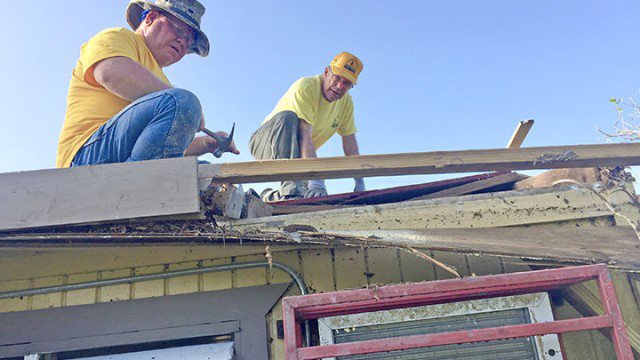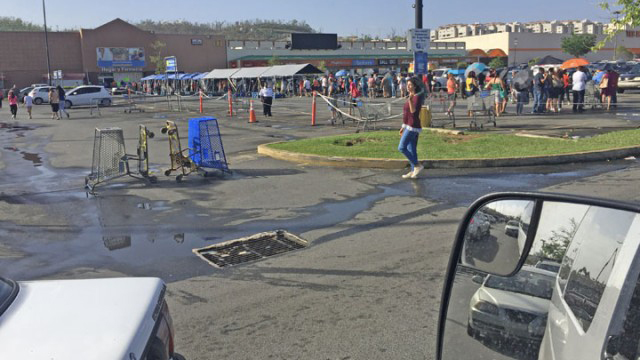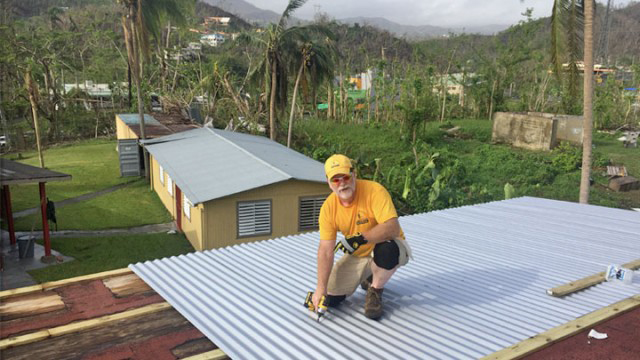 [1]
[1]GUAYNABO, Puerto Rico (BP) — Flooded streets, potable water shortages, communications disruptions, power outages and six-foot-long iguanas were among the obstacles encountered by eight Southern Baptists of Texas Convention volunteers in completing initial projects to facilitate Southern Baptist Disaster Relief efforts in Puerto Rico following hurricanes Irma and Maria.
 The SBTC team deployed Oct. 15-23, responding to SBDR national director Sam Porter’s request to establish a communications center at the Seminario Teologico Bautista in Guaynabo, southeast of San Juan.
The SBTC team deployed Oct. 15-23, responding to SBDR national director Sam Porter’s request to establish a communications center at the Seminario Teologico Bautista in Guaynabo, southeast of San Juan.
The Baptist seminary property is also home to the offices and conference center of Convencion de Iglesias Bautistas del Sur en Puerto Rico y Islas Virgenes, the Southern Baptist Convention in Puerto Rico and the Virgin Islands.
Porter also requested a small construction team to reroof buildings on the five-acre seminary grounds. With its kitchen, chapel, shower facilities and capacity to sleep 60, the seminary site is expected to become a headquarters for SBDR recovery efforts, Porter said in an Oct. 9 email to SBTC DR director Scottie Stice.
Stice had affirmed the decision to assist Puerto Rico, noting that while SBTC DR continued to respond to Hurricane Harvey’s destruction in south Texas, communications teams were no longer in the field and a roofing crew could be spared.
“We went with able hands and bodies to do whatever needed to be done,” said DR volunteer Paul Cothren of Atlanta, Texas.
 Using corrugated metal over wood slats, SBTC volunteers reroofed three dormitories and a guest house, said George Yarger of Mabank, SBTC DR communications unit director.
Using corrugated metal over wood slats, SBTC volunteers reroofed three dormitories and a guest house, said George Yarger of Mabank, SBTC DR communications unit director.
The volunteers first had to secure their own outdoor sleeping area from wind-blown rain by covering the open porch of the dorm above the kitchen and meeting area with plastic sheeting.
“You’re on an island. There’s a chance of rain every day,” Yarger said.
“We made the decision to stay [at the seminary] to get the greatest amount of work done. We hunkered down,” Cothren said.
Cell coverage was initially unreliable. Yarger set up a VHF, UHF and HF ham radio communications station at the seminary, enabling those onsite to maintain contact with the Red Cross VHF network.
Cell phone repeaters provided by the North American Mission Board also proved instrumental in improving communications early in the deployment, Yarger said.
“The VHF net was for emergency services. We checked in [regularly],” he said, adding that cell service was eventually restored, possibly negating the long-term need for ham radio operations.
 “We left all the equipment behind for the next team to use,” Yarger said. “I am not sure they will need it, since the last 72 hours we had very good cell phone data. That’s the hope anyway.”
“We left all the equipment behind for the next team to use,” Yarger said. “I am not sure they will need it, since the last 72 hours we had very good cell phone data. That’s the hope anyway.”
The volunteers also used a mobile radio unit to contact team members running errands in the group’s rented van. Yarger estimated he drove “2,000 miles back and forth to Home Depots.” Usually GPS navigation on cell phones proved reliable for such runs, but not always.
Obtaining water proved challenging. Volunteers got water from gas stations in addition to joining locals in filling jugs from nearby springs. The springs, which normally flow in ditches alongside roads, were channeled via PVC pipes which “mysteriously appeared” after the storm, Yarger said, adding that none of the residents he asked knew who had provided the makeshift conduits.
The SBTC crew used a small filtration system belonging to Yarger, then a larger UV-operated unit provided by the North American Mission Board to purify water for drinking and cooking.
The lack of electricity continues to stall recovery in Puerto Rico. The SBTC team reported lines of 200-300 people waiting to get inside Walmarts or Sam’s Clubs, many hoping to purchase generators.
“Everything hinges on electricity. As long as the power is off, [Puerto Rico] is not going to be a modern society,” Yarger said, adding that local sources indicated power would not be restored until mid-November.
Although electricity was scarce, eternal connections were made not only on the ground in Puerto Rico but also in the skies during the team’s 25-hour journey home from the Caribbean.
On the flight from St. Thomas to Miami, Yarger sat next to 65-year-old Jackie of the Virgin Islands whose son had died in the hurricane when the roof of his home blew off and a wall collapsed.
“My son was a Christian. He always wanted me to go to church with him. I never took him seriously. Now I wish I had,” Jackie told Yarger.
Yarger and another passenger, also a believer, led Jackie to Christ.
“I will see you all again,” Yarger told both women, referencing heaven as they arrived in Miami.
